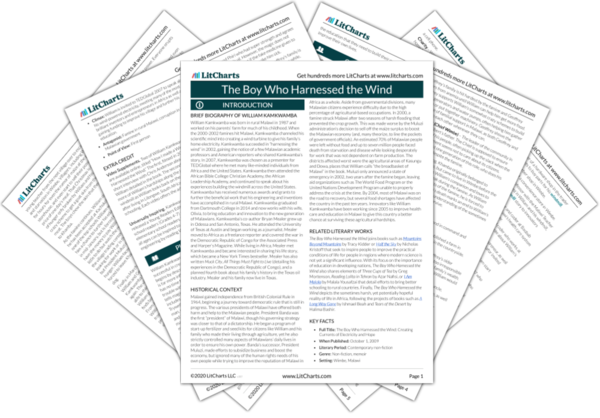Science and superstition are at first at odds in the novel, as William tries to implement advances in science and leave behind the old magic beliefs. As William learns more about the scientific principles at work in the world, he believes less in magic that works good and evil upon people. Science improves William’s life, both physically in his inventions and emotionally in the confidence that William gains in himself free from the threat of magic. As a young child, William was incredibly afraid of angering those with magic, and sought to control his own magic as a way of fighting back. As he grows, William turns to education and scientific advancements as a form of power. The people of William’s village must also come to terms with science rather than magical beliefs. While many villagers see William’s windmill at first as an evil, magical tool, the newspapers hear of William and validate the good work that William has done by bringing wind-powered electricity to his village. Science then seems to win not just William’s heart, but the spirit of the larger community.
However, William does not completely reject magic the way people like his devoutly Christian father do. Though William respects Trywell’s disdain for magic, William does not entirely abandon the thought of magic at work in people’s lives. Many of his references to magical events have an ironic edge, but he rarely dismisses magic as false, unconvinced that a world without magic can entirely explain all of the strange, frightening, or wonderful occurrences he has heard of. One of the few times that William does directly contradict magic is in the treatment of disease, especially when he advocates for Malawians to seek Western medicinal treatment for the diagnosis and prevention of HIV and AIDS. In other areas, William maintains the ideas that his fellow rural Malawians have about magic, such as the stories about powerful chiefs that brought Malawian people fame or glory. As William grows more comfortable in the ways that science can explain the world, he does not reject the idea that magic may have some influence over people’s lives. William only seeks to introduce scientific inventions or principles that may benefit the Malawian people. The book as a whole suggests that science and superstition can coexist and enrich the lives of people in their own ways. While science can improve the physical conditions of people’s lives, superstition enlivens the imagination, stories and culture of Malawi.
Science vs. Superstition and Magic ThemeTracker

Science vs. Superstition and Magic Quotes in The Boy Who Harnessed the Wind
Before I discovered the miracles of science, magic ruled the world.

Unlock explanations and citation info for this and every other The Boy Who Harnessed the Wind quote.
Plus so much more...
Get LitCharts A+My first and only experience with magic had left me with a sore eye and hands that throbbed from bad medicine. With my luck, I thought, they'll probably become infected and fall off.
No magic could save us now. Starving was a cruel kind of science.
Just then a gust of wind slammed against my body, and the blades kicked up like mad. The tower rocked once, knocking me off balance. I wrapped my elbow around the wooden rung as the blades spun like furious propellers behind my head. I held the bulb before me, waiting for my miracle. It flickered once. Just a flash at first, then a surge of bright, magnificent light. My heart nearly burst.











